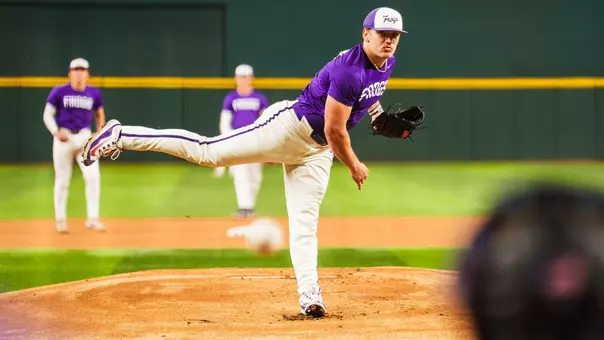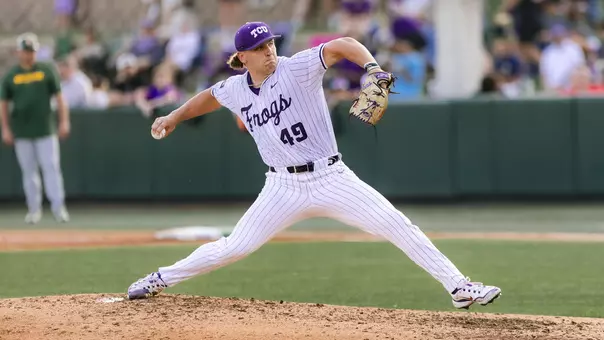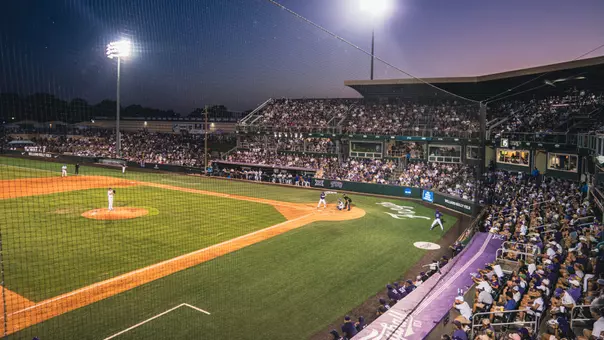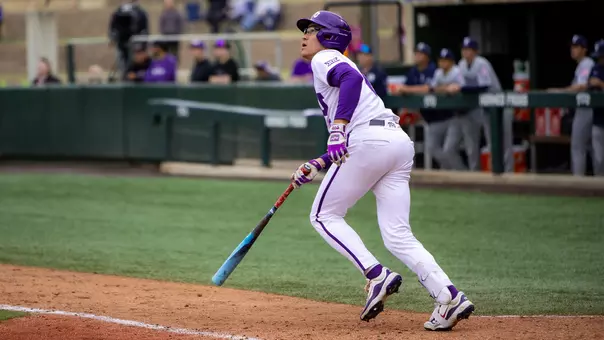
Q&A With Head Baseball Coach Jim Schlossnagle
9/30/2003 12:00:00 AM | Baseball
Sept. 30, 2003
Fort Worth, Texas - Horned Frog Sports Reporter Don Dowell recently had a chance to sit down with TCU baseball coach Jim Schlossnagle. Here is a transcript of that question and answer session...
You won't find TCU's new head baseball coach on the fairway of number nine at Colonial trying to hit his approach shot over the pond. Or cruising around Lake Texoma looking for the latest white bass hideout. Or kicking back in a duck blind.
"I don't play golf, fish or hunt," Jim Schlossnagle said. "I'm a big believer that this is not a job, it's a lifestyle. I don't think TCU fans hold me accountable if I'm on the golf course. I'm here, whether it be recruiting, working on the field, or talking to the community, that's what I was hired to do. It's not an 8-5 job. There is a time for downtime, but I don't relax very well. I'd rather be here than in a duck blind. I won't hire anyone that does those things either, because it doesn't help us get better. We need to be here for our players."
What Schlossnagle really enjoys doing is putting together a College World Series contender.
In just two years, he led UNLV to their first-ever regular season championship, compiling a 77-47 record, while earning MWC Coach of the Year honors. Prior to that, he helped turn Tulane into a perennial contender in his eight-year stint as associate head coach and head of recruiting.
The energetic 32-year old native of Hagerstown, Maryland didn't grow up thinking he would go into coaching.
"I was a journalism major for my first two years," Schlossnagle recalls. "I thought I wanted to be Rick Reilly and write for Sports Illustrated. In my sophomore year at Elon, our college coach, Rick Jones, who's now the head coach at Tulane, called me in one day and said 'you can always play, but I think you'd be a great coach. I think if you started now, you'd be that much ahead of the game.' So that's what I did. Changed my major to education, and I was a student assistant for the last two and half years of school."
As well as an eventual magna cum laude graduate. He later earned his master's of education in human performance and health promotion from the University of New Orleans in 1995.
Schlossnagle is really excited about the challenges and opportunities that TCU presents.
"I was not looking for a job when I was at UNLV. I was very happy there. But there was one place in the country that I would have left it for and that was TCU. This is the place I want to be and I want to be here as long as they'll let me be the coach."
What attracted you to the TCU head coaching position?
I wouldn't have accepted the job if I didn't feel that you could achieve at the very highest level in college baseball. I always tell my players that it's not just their future, it's my future too, and their goals are the same as mine. Get to the College World Series and have a chance to win the national championship. UNLV is that kind of place and they gave me the opportunity, and it was awesome. But this was more suitable to me personally as well as professionally, and that's why I came here. I wasn't looking to leave.
What are your expectations for the program?
We should be a team that should finish at or near the top of C-USA on a yearly basis, and that means you are in the NCAA tournament. We should be a regional team every year once we get going. Beyond that, it's the luck of the draw. One of the great things about this ballpark is that it gives you a chance to host a Regional, which is really how you get there. I've been a part of nine Regionals, and been to Omaha once. Eight times I went on the road. The one time we hosted, we went to Omaha. That's no big secret. We want to recruit the best student-athletes and I enjoy being at a private school.
Will you recruit heavily in the DFW area?
We'll start here. We're going to sign the best available player regardless. We want to get to the point where the best players in the state are thinking about TCU first.
You seem like an ideal fit with your experience and success at Tulane.
The last three years I was there, I monitored heavily what was going on here, because I thought I was a great fit. Having recruited to an elite academic school in the South for eight years gave me great training ground for this. It's a bigger challenge, but there are a lot of positives to go with it.
What did you learn from your two-years as head coach at UNLV?
I was pretty prepared. The head coach at Tulane gave me a lot of responsibilities as an assistant. I did everything from arranging travel, recruiting, to taking care of the field. At UNLV, managing the staff was the biggest challenge. It was tough for me to hand things off in a lot of areas. I did have to learn how to direct and delegate, but not micro-manage.
What type of team will you have?
We'll take on the strengths of our team. We'll always sign the best available players. If the best available players are big, strong power hitters, then let's go. But we'll always sign pitching.
What is your baseball philosophy?
My baseball philosophy is to be aggressive on offense, conservative on defense. On offense, we want to force the action and don't want to strike out. Put the ball in play and force the other team to make mistakes. Bunt and hit-and-run. But if we have a club that can really drive the baseball, we'll wait for a three-run homer. This park is pretty big with a lot of foul ground. I'm a pitching guy, so our teams will be built on pitching and defense. On defense, we're always going to get the sure out as opposed to gadgets like a trick bunt defense or a trick pickoff play.
You seem to have a knack for developing pitchers.
That's what I did at Clemson and Tulane. I hired a pitching coach when I first got to UNLV, and that was a mistake. I can't turn that over to anybody. I know I can do two things - recruit players and coach pitchers. I don't claim to be a great hitting guy, though I can evaluate hitters.
Do you like to develop a closer?
I'm a big believer in the bullpen. If we're going to have 25-30 guys on a travel roster, they need to have a role, or they don't need to be around. In order to have a good bullpen, you have to use it. With every team I've coached, we've tried to develop a go-to guy in the bullpen, because it gives everyone a sense that if we can just get to the 8th with a lead, we're in good shape. By design, I like to have 3-4 starters, two middle relievers, a setup guy or two, a lefty specialist and a closer.
Where do you see C-USA in the national picture?
It's the premier new league in college baseball. Everyone in the country is now realizing that. Two years ago, five teams from C-USA went to the NCAA Tournament. That's a lot when part of the league is in the cold weather climate. With the schools in the south and how good they are - TCU, Tulane, South Florida, Southern Miss, East Carolina, and Houston - those are six of the premier teams in the country, all in one league. I like the league and I hope it stays together. I also like the travel in the league.
There are a lot of holes heading into the season.
We lost every position starter except the DH. We're going to rely heavily on the returning guys that didn't play and some of the incoming guys like Shelby Ford, German Duran, Chad Huffman and Omar Arif. I haven't seen all those guys play yet.
Talk about your new staff and their responsibilities.
To be honest with you, I wouldn't have accepted this job if I couldn't hire Todd Whitting. I wanted someone who's recruited and played in the state. He helped develop Houston, who's been knocking on the doorsteps of Omaha three of the last four years. He's been a huge part of their success. He wanted to make this move, which says a lot about this program. He left his alma mater. He will be the recruiting coordinator and his job is to make sure we have good players. He'll also coach the infielders and he's had great success at that. Houston's been in the top five or six defensively the past couple of years.
Matt Siegel was our volunteer coach at UNLV, where I hired him out of the Cape Cod league. He's one of the most impressive young coaches I've ever been around. He was a self-made player who played at Florida and was an all-academic SEC player. Very widely respected throughout the country at a very young age. He's going to coach our hitters and I have full confidence in his abilities. When the day comes when Todd leaves to become a head coach, Matt will be a great guy to step into that role.
Heath Autry is our volunteer coach. He's been a junior college coach in the state for a long time. Junior college baseball is something we'll recruit at various levels depending on the situation of our program. I wanted someone who had good relations with people. He's an outstanding baseball coach who's been involved with youth baseball in the metroplex for a long time. He'll coach the catchers, help me with the pitchers and may coach first base.
Mike Dilley is in the new baseball operations position. We are still researching what he can do on the field. He'll be involved in camps, travel and on-campus recruiting as well as the baseball booster club we are going to form. Also evaluation of practice through video. We're going to have a dugout club where people will have the opportunity to be heavily involved in the program and help us financially. There will be different functions throughout the year.
Will you be involved more with the community and have more camps?
Heavily involved. I will speak to anybody who will listen. We'll have 7-8 camps throughout the year. I feel this is not my baseball program; this is TCU's baseball program. And this includes the community. I want them to feel like they have access. Our practices are always open. I want every seat to be a season ticket holder. If we play the kind of schedule we're going to play, and have a great club, and we're out and about, they will come to the games.
What is your philosophy on scheduling?
In this state, recruiting against the Big 12, if you want to get those players, you have to play those teams. We're going to play Tech and Rice in a home-and-home series. Eventually we're going to play two games every year versus Texas, and hopefully Texas A&M, Oklahoma and Baylor. I also like to take a west coast trip. It's fun for the kids and it helps our RPI. UC Irvine, Cal St Fullerton, Pepperdine, all those teams have interest in us playing them. Bottom line, we're going to play the best people.
Why have private schools like Rice and Tulane been so successful lately?
One of the main reasons is the draft. The academic schools are able to hold players from the draft. For whatever reason, baseball has almost become a white-collar sport because it is expensive to play. You don't see a lot of underprivileged kids who are great students that are playing baseball. Another reason is the academic schools have committed to building strong baseball programs. It used to be just the big state schools that could afford to commit to baseball, but now, with the expansion of the NCAA Tournament, you see schools like TCU building stadiums like this because it's a viable revenue option. If you're a good student who can combine getting a great degree with playing in good weather, why wouldn't you do it? When the draft comes around, for a 1200-1300 SAT student, it's going to take a lot of money for those players to sign. You don't see Stanford or Tulane players getting drafted very much, because teams don't want to waste a draft pick.
Why have you promoted moving the college baseball season to the summer, April to August?
I hope it comes about. That's the ideal situation for our profession, the sport, the student-athlete and the school. If you look at the success of the Cats and the Frisco team, it would be even greater here. Minor league baseball is about the experience, not the baseball. College baseball would be about both. Fans would get the opportunity to see great players for three to four years. For the student-athlete, he would be a traditional student during the academic year. We wouldn't need fall baseball. We would have spring training in the spring, and then go. For the schools, they would benefit financially because TV would become a viable option in the summertime. It makes too much sense.
What it's going to take is for the Presidents to put the cart before the horse. What they say is we're going to have to pay to put players up in the dorm during the summertime. Do you realize how much money you're going to bring in when we're playing a series against Texas on a weekend in June? Michigan and Michigan State play before 106,000 fans in football, but about 40 in baseball because its 30 degrees. How many would go if they played a weekend series in July? Why is Round Rock drawing 10,000 fans? Because it's the summer time. We're the only sport that doesn't play the same season as the pro leagues.
Did you play other sports in high school?
In football, I was the QB until my junior year, then I was the Mike Renfro of wide receivers. I was the possession receiver who wasn't allowed to run with the ball. In basketball, I was a guard on a state runner-up team. Baseball, I was a pitcher and middle infielder.
Did you have a favorite player or team growing up?
The Red Sox. Carl Yastremski and later on, Roger Clemens.
Is there a manager that you've really liked?
Not really. I follow more college baseball. It's the same sport, but a different game. Tony LaRussa. I've gotten to know Bobby Valentine and Tommy Lasorda really well. I like those guys. Obviously Joe Torre. There's no one I hang my hat on.
What's most rewarding about coaching?
Relationship with the players. I love being around them, in the dugout and in the hotels on the road. I also like program building and seeing it all come together. In two years at UNLV, we went from 23-33 to being 15th in the nation. To see the whole community get excited about that is awesome.
Are you a traditionalist?
Definitely old school. Facial hair policy and no ear rings. Also in the way we play the game. I believe in playing the game the right way, respecting the game, your opponent and playing hard. Do the right things on and off the field.
If you could have dinner with anyone, who would you invite and what would you have?
Jesus. Dr. Bobby Brown is an amazing person. President Bush. And Don Zimmer, he's a great baseball guy. We'd have the best steaks I could find and good desserts. I have a bad sweet tooth.













